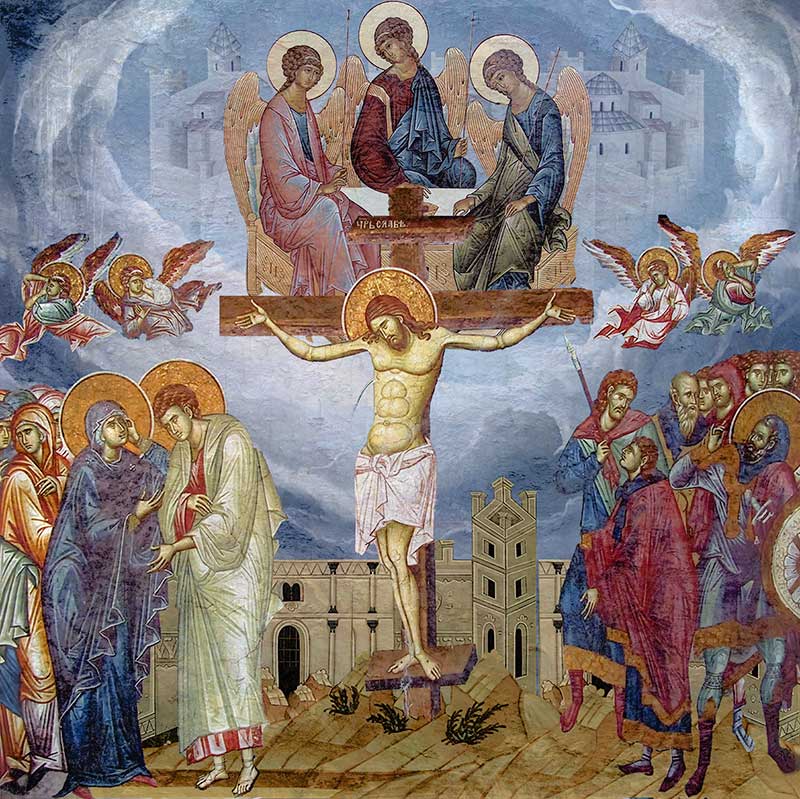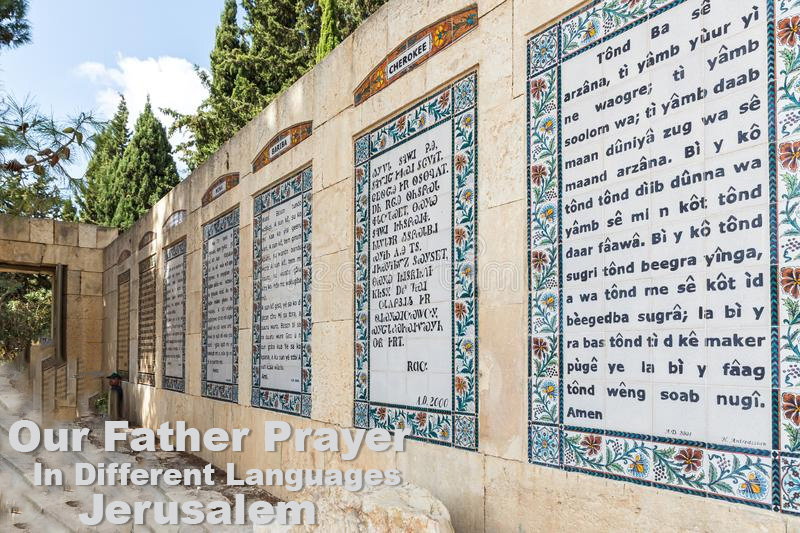We should pray for those who have hurt us, because only the victim has the right to truly forgive. Therefore, when we sincerely exclaim, as Christ exclaimed on the Cross: “Father! Forgive them because they do not know what they are doing “, we can also say with joy:” may Your name be sanctified, may Your will be done, may Your Kingdom come “- and may we call God our Father.
Our Father which art in heaven, Hallowed be thy name. Thy kingdom come.
Thy will be done on earth as it is in heaven; give us this day our daily bread; and forgive us our debts, as we forgive our debtors.
And lead us not into temptation, but deliver us from evil.
For years, it was extremely difficult for me to say the Lord’s Prayer because I could not understand the direct connection between my life and that prayer. Over time, I came to the following conclusion: the whole prayer of the Lord is like the way from earth to heaven, the way from ruin to life.
Some of you probably know the story of ancient Israel and the flight of Jews from Egyptian slavery. They came to Egypt freely, but the natives gradually enslaved them, and they lived a bitter life, in slavery, in which they still did not forget their God. And from the depths of this slavery, these misfortunes and slavery, they were able not only to pray to Him for freedom but also to glorify Him.
This is where the real spiritual, Christian life begins. In every situation in which a man finds himself, no matter how dark and terrible around him, if he is a true believer, if he truly believes that nothing in his life can happen without God’s providence, he will exclaim from the depths of darkness: “No matter what, Lord, glory to You, glory to Your name! .. “
The darkness I am talking about may be due to external circumstances, which are sometimes so painful and terrible: hunger, cold, abandonment, persecution, dungeon, war, situations in which the closest person leaves a person, the moment when the closest may consciously betray us …

It also happens that it is inner darkness, the darkness of despair: life has no meaning, its content is so bitter and desolate that it no longer makes sense to live … In any case, in whatever circumstances we find ourselves, if God is with us, well and if we are in the deepest darkness, we can say: “Regardless of everything, Lord, glory to You! ..”
This is where the real spiritual life begins, and I would say heroic, because there is no other Christian life at all. Only then can the same thing happen to us that happened to the ancient Israelites: at some point someone will enter our lives and say: “Get up, let’s go, let’s go to freedom, to inner freedom, to such freedom that no one will ever be able to take away from us. We will be delivered from every lie, from the deception that we have been defeated forever, from the faith in darkness and not in the light, from every untruth of life, from everything that destroys us from within …
And further: “Do not lead us into temptation.” On this path to inner freedom and the celebration of life, there will be temptations from the outside: Think of yourself! Forget about God, forget about everything that can make you different from other people and make you a sacrifice; forget it, live like everyone else, join the herd …
Inner voices say: Are there so few attractive things in the world? Will I suddenly have to give up everything in order to enter an unknown area of spiritual life? Is it worth such waivers? I am afraid… That is why we must pray: “Lord, do not let temptation overwhelm us, do not let fear overcome us, give us courage, wisdom, strength, humility and faith to You.”
Presenting the Lord’s Prayer as a way to God, we came to a place whose importance I have already pointed out: forgive as we forgive … This is an important moment.
However, what does the word “forgive” mean? We always think that to forgive means to forget. Forgiveness does not mean forgetting, because anyone who is not very offended can forget – a person got angry, and then the insult passed. However, there are such insults that are not forgotten, and we are still asked for forgiveness. These are the doors we need to enter: if we don’t go through them, we don’t go anywhere … So, forgiveness starts from the moment we look at the man who insulted, humiliated, hurt or made us unhappy and suddenly we start to feel with all our being that he is a vulnerable and pliable man, so that he might want to be different, but he can’t – he is weak. We understand that the insult he inflicted on us did not arise from his malice, but because he is a coward, a discouraged, greedy or petty soul.
Then we will be able to look at him with completely new eyes, not as a diva trying to destroy us, but as a man in whom there was not enough generosity and inner beauty to be worthy of his human name
And at that moment, we will be able to forgive, to bear the consequences of his malice, and for us to cry out the way Christ cried out when he was crucified: “Father! forgive them; because they don’t know what they are doing. “
Of course, this is not easy, it is one of the most difficult feats, but we need to understand that in God’s eyes we are no better than the man who insulted us so much. Because each of us commits a sin at every step, shows a lack of attachment, or even contempt and indifference to God – either directly or by behaving badly towards others. And our calling is to treat people the way Christ did. If we do not do that, we are not faithful to Him, we are not faithful to our neighbor and we are not faithful to ourselves.
That is why we should pray for those who have hurt us, because no one but the victim can forgive. Only the victim has the right to truly forgive. This right was given to us by God and is somewhat similar to His right to forgive.
Therefore, “Hallowed be Thy name, Thy will be done, Thy Kingdom come” – let us forgive, that we too may call God our Father.
Metropolitan Anthony Blum

